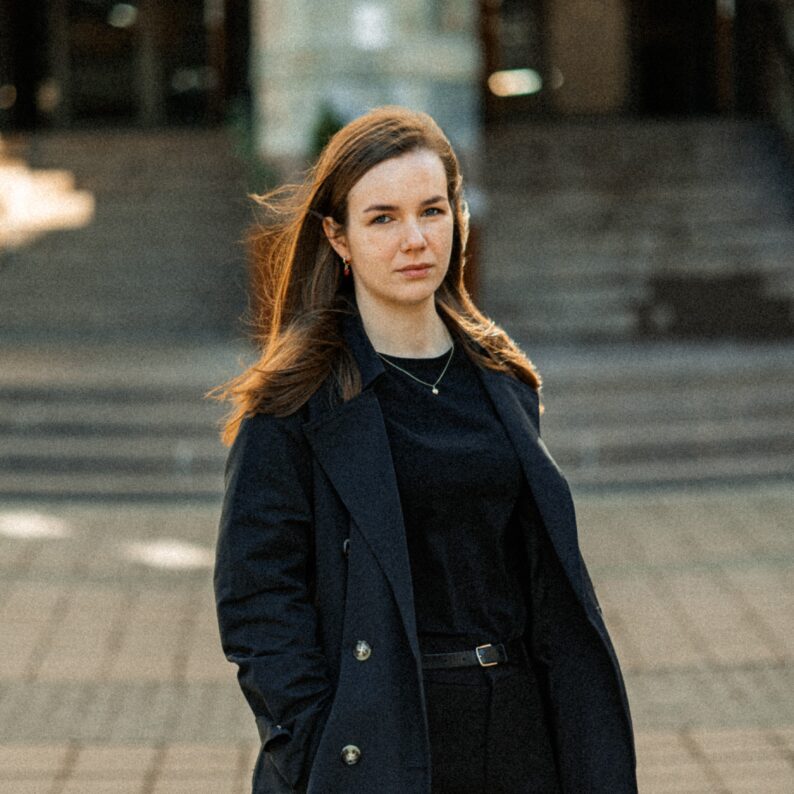


‘The scientific community have great power to impact the entire world’ – Speech at the University’s opening ceremony
Chair of HYY’s Board Laura Wathén and Chair of the Board of the Helsinki University Researchers’ and Teachers’ Association Tommi Kokkonen delivered the joint greeting of the Student Union and the University staff at the opening ceremony of the academic year on 2 September 2019. If you missed the speech at the opening ceremony, you can now read it in its entirety below.
LAURA WATHÉN AND TOMMI KOKKONEN: SPEECH AT THE UNIVERSITY’S OPENING CEREMONY ON 2 SEPTEMBER 2019
Laura Wathén:
Mr President, Mr Chancellor, Mr Rector and distinguished Vice-Rectors, members of the University community and other guests.
As the chair of the board of the Student Union, I am honoured to be speaking to you from the stage of this particular building. The Old Student House will celebrate its 150th birthday next year, and many generations of students have passed through its doors over the years. These walls have witnessed political debate, celebrations, plans for revolution, friendships being forged, learning, falling in love and dreaming about a better future. This building and other spaces important for the University community provide people with places to meet each other genuinely face-to-face. These facilities also provide us, members of the University community, with places to study, conduct research and have meaningful discussions about socially important topics.
I claim that a memory trace related to a location is particularly strong. Today Tommi and I, through this dialogue about the University and the University community, will have a chance to create a memory trace for you on things that matter to us.
Tommi Kokkonen:
We are the University. Taking my student years into account, I have now belonged to the University community for about 13 years. However, a couple of years ago, I woke up to the realisation that something had changed. I was browsing through the University and my unit’s new website and marvelled at the stylised fonts and illustrations, but couldn’t find the information I was looking for. Sue Scott, who compiled a report on the organisational reform, made a similar point. The search terms University of Helsinki and sociology gave Sue Scott a hit about Sue Scott and the report she was compiling. A website in itself may be a secondary and superficial change, but this anecdote illustrates a new awareness of how the status of the University is changing in society. Nowadays, the University must communicate its excellence and importance. It must advertise how relevant its research is, how great its degree programmes. However, research does not equal the website. Its relevance does not stem from illustrations or stylised texts.
The University asks in its strategic plan: How will we continue to achieve excellence? Only recently was it reported that the University of Helsinki was once again ranked among the top one hundred universities in the Shanghai ranking. However, it must also be asked who these university rankings serve and what they tell about the quality of work performed at universities. Universities’ core duties are high-quality research and teaching. It is questionable what various rankings tell about these. Rankings have not been primarily created for the evaluation of the quality of research, and in reality various citation or reputation indicators are not really suitable for this kind of evaluation either. On the contrary, all of these indicators have been found to have various negative effects on conducting scientific research.
As a concept, high quality requires criteria, not comparison, whereas “top” as a concept presupposes comparison. Ultimately, the quality of research is evaluated by the disciplinary communities, not consultants, financial publications or marketing departments. High-quality research is not born out of organisational reforms or slogans. My anecdote about the website makes one wonder whether reforms sometimes focus on what things look like instead of placing the spotlight on users and creators. For example, the reform of workspaces should start from preconditions set by research and teaching, in other words, the needs and wishes of the people who do the work. We can’t just adapt to something that someone high up has deemed appropriate for us. I am glad to say that to my understanding we have established a dialogue with the current, reasonably new leadership and we can work together open to hearing each other.
Laura Wathén:
I agree with Tommi that the current rector and vice-rectors are particularly open to listening and are interested in the students. During the election in the spring, in particular, it felt like we agree on what kind of higher education policy is needed. The University of Helsinki’s #ResearchMatters parliamentary election campaign pins were a success among students, and they continue to adorn the backpacks of students even this autumn.
The #ResearchMatters campaign conveyed our message to decision-makers on the significance of science and research-based education for the wellbeing of society and the future of the Earth. We, the members of the University community, know that the significance is invaluable. The budget negotiations this autumn will tell whether the message has reached the government.
In addition to safeguarding the preconditions of the University activities, it is our common task this autumn to create a shared vision of the future. A dream towards which we will work every day.
It is important for the Student Union that the significance of the input of members of the University community is evident in the University’s strategic plan. The participation of us students in the decision-making at the University is immensely valuable – after all, we are experts in what it means to be a student. We can offer perspectives which, combined with points of view of other members of the University community, provide us with a better understanding of our shared strengths and challenges. We wish to do our part to develop the University as equal partners in the University community. For this reason, I propose that in the next few years we develop the University of Helsinki into a model of university democracy and introduce an equal tripartite administrative model.
It is important to the Student Union that the importance of community within the University is strongly present in the strategic plan. A sense of community contributes to an inspiring and encouraging work and study culture. It brings us together to gain insights and defend the values the University represents in society: education, criticism and the quest for truth. The experience of our common academic community starts already during the fresher year. It also encourages some students to pursue a career in academics.
Tommi Kokkonen:
The University is not just any workplace; it is in many ways exceptional. I dare to claim that people at the University are exceptionally motivated, skilled and committed. One of my senior colleagues once said that the relationship with the University is primarily spiritual and intellectual in nature. This is well illustrated by the fact that work is performed in atypical employment relationships or without an employment contract on a grant. Our recent survey of young researchers revealed that employment at the University is for many beginning scholars a dream that at times seems unattainable. Insecurity over one’s career, employment and livelihood shadows the work of these motivated doctoral candidates and recent graduates. Employment contracts or grants are often only for one year at a time, and before the public examination of the dissertation a doctoral candidate will have gone through several of these short-term funding periods. Up to one-third also have periods of unemployment, during which – at least officially – the research is suspended. From the perspective of grant-funded researchers, at times it seems that universities have two castes: those with an employment contract and related rights and opportunities, for example, for all key research facilities, and those who do not necessarily have them.
The European Commission’s European Charter for Researchers emphasises that research work must be professional from the very beginning. It is our conclusion that this is not achieved in all cases. The University of Helsinki doctoral schools have functioned well in consolidating funding and professionalism, but there is still work to be done.
The quality of research also depends on the resources used. The most important resources are money and time. Approximately 60% of teaching and research staff continue to work under fixed-term employment contracts. Fragmentation and the short duration of research funding are clear factors negatively affecting the quality of research. Applying for research funding takes time away from research, and short-term funding causes interruptions in research projects. Moreover, the uncertainty caused by short-term funding results in difficulties in coping with work – this is true particularly of young researchers. Experiences of stress among our members have increased in recent years.
Laura Wathén:
As a student, it is easy to relate to many of these feelings. Uncertainty about coping, grades, the climate and the future causes stress and consequently makes it harder for many students to cope. This is an important theme for me personally.
Raise your hand if you or someone close to you has suffered from exhaustion, depression or insomnia, for instance. According to the School Health Promotion study, one in three students in general upper secondary schools feels like they are drowning in school work a few times a week. According to the Finnish Student Health Survey, on the other hand, 30% of higher education students have mental health symptoms. The path from secondary to higher education should not be a stressful journey full of pain – and the journey definitely should not continue like that at the University.
A major factor in creating problems with coping among students is the constant worrying about insufficient subsistence. It really stung to learn that the study grant will still not be raised despite the promises made before the elections. Students continue to be the only group expected to get into debt to cover their basic subsistence – forced to buy their macaroni and soy mince with borrowed money.
The Student Union hopes that the University would support students by, for instance, investing in student counselling, increasing flexible teaching methods and offering the help of study psychologists. I hope that the University, for its part, makes sure that no students are abandoned. And if and when the universities will be receiving additional funding, I hope that part of it will be allocated for this purpose – supporting students and developing teaching.
Tommi Kokkonen:
High-quality teaching requires proper resources – a fact that the Minister of Finance seems to have forgotten. Increasing student intake and saddling universities with the responsibility for lifelong learning require additional resources which are lacking in the budget proposal. However, the University has increasingly invested in high-quality teaching. The Teachers’ Academy and training in university pedagogy speak of the general increase of appreciation for teaching. For a researcher of teaching this is obviously a pleasing trend. Still, there are things to develop. There are no clear criteria for acquiring additional academic qualifications through teaching. For example in recruitment, applicants’ teaching or supervision experience are nearly worthless compared to publications in English.
Laura Wathén:
In addition to University decision-making, the University community must also be heard in societal decision-making. Research conducted at the University plays a key role, for example, in the mitigation of climate change and the creation of a more equal society. Education provided by the University turns us students into world-changers.
In the best case scenario, we are also turning into world-changers by our activities outside the lecture rooms. Student activities, for example, in non-governmental organisations and start-ups teach us an enormous variety of skills needed in both our professional and personal lives. Consequently, the Student Union has this year launched talks with the University about how these civic activities could be included as part of the degree.
We are also cooperating with the University in the creation of a totally new course that will become part of each degree programme in the future. The course is a sustainability course which will provide students with knowhow on solving global environmental issues. Environmental consciousness is also evident in the University operations in the form of the compensation of carbon dioxide emissions caused by the flight travel of members of the University community. We are proud of our University, which once again leads the way in society.
I am the first university student in my family, and my first year at the University I felt like I had stepped into a new world. Even though sitting in lecture rooms and cramming for exams in the Kaisa library slightly dampened my feelings of novelty, I still think like I did a few years back: the academic community possesses great power to affect the surrounding society and the whole world. We, the members of the University community, should be ambitious and support each other to enable unbiased thinking and future solutions.
Tommi Kokkonen:
The members of the University community are committed to their work, and all activities should aim at supporting it. Therefore, the University community – both the staff and students – needs to be heard in decision-making and management. They are the experts on their work.
A good start of the academic year to all of you!



